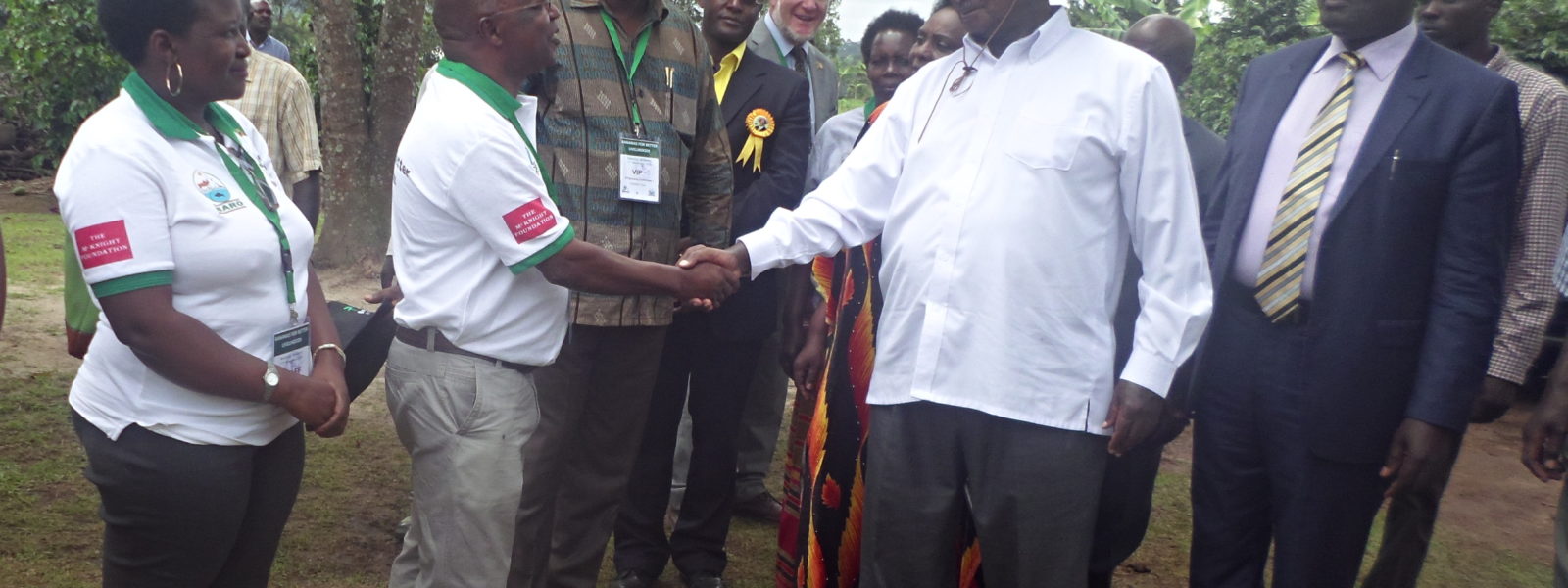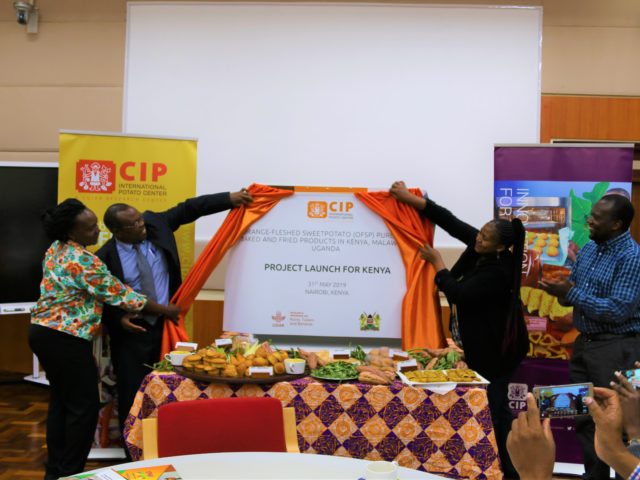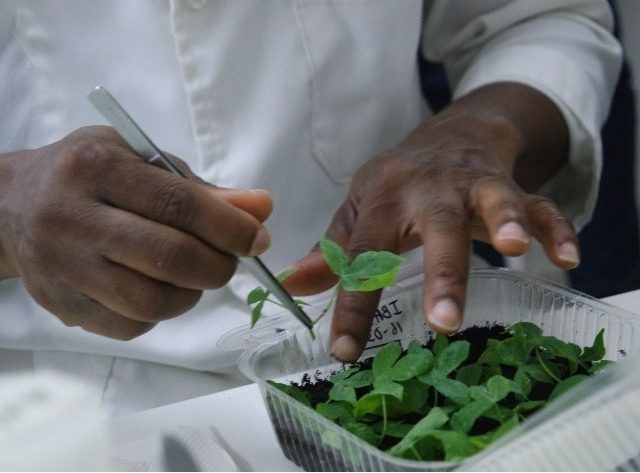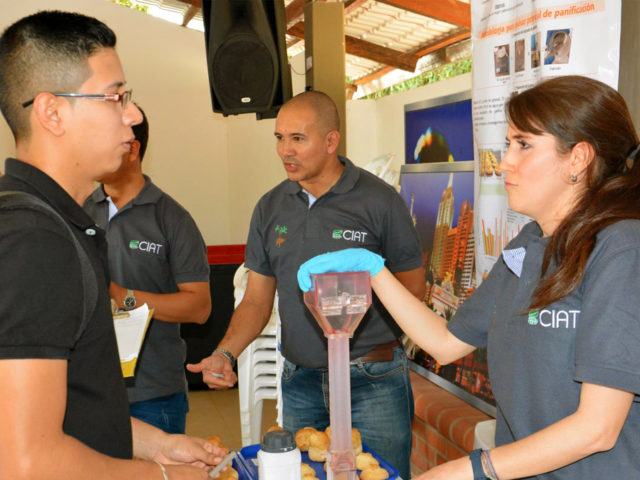Story by Joshua Turyatemba for Bioversity International
Banana is one of the most important sources of food and income in Uganda. People consume on average 7 bananas per day and the local word for bananas – matooke – means food.
Last Friday 11 November 2016, Ugandan President Yoweri Museveni officiated at the first Banana Farmers’ Day, held in the South-Western district of Bushenyi. The district is one of the most affected by the banana bacterial wilt (BBW) infestation that peaked in 2013, with some farmers losing entire plantations and their source of income.
In a collaboration involving Bioversity International, the National Agricultural Research Organization-NARO, together with the Kenyan counterparts – the Kenya Agricultural & Livestock Research Organization – and the Rural Energy and Food Security Organization, scientists piloted a project and used control measures that saw the disease incidence reduced by 90-98% within 6 months of intervention.
The President visited one of the farm households involved in the project who had excelled at combating BBW using the control tools developed by Bioversity International and NARO. He later toured an exhibition of banana-related inputs and products and local projects such as the community seedbank.
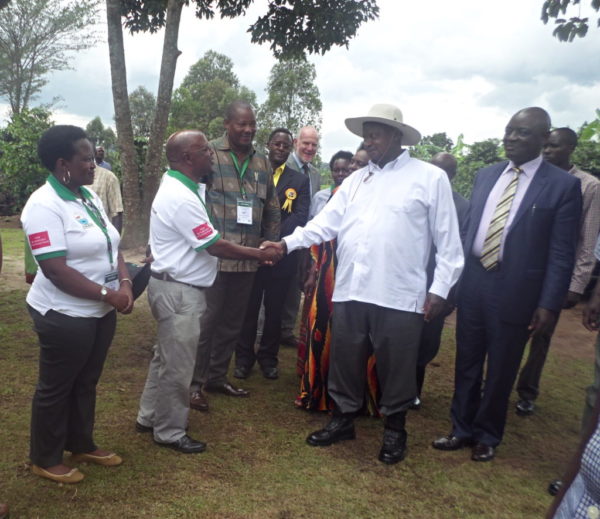
Dr. Eldad Karamura, Bioversity International Regional Representative for Eastern and Southern Africa, welcomes President Museveni to the first Banana Farmers Day in Bushenyi, Uganda. Photo: J.Turyatemba/Bioversirt
In appreciation of the effort, the President offered four heifers to the homestead to enable them to increase their income as well as a source of manure for the banana plantation, which has since recovered and is now very productive. In the Bushenyi district, the disease incidence on farm has been brought down from 70-100% in 2012 to 2-5% currently.
Addressing the guests later at the ceremony, President Museveni said he is committed to ensuring that incomes at household level increase through mixed farming: “If a person has 4 acres, it is possible that by planting bananas, tea, coffee and rearing animals he can generate over 100 million Uganda shillings per year.”
Giving the example of Mr. Stanley Rwabukye, the host farmer who currently generates about 20 million shillings, the President said that he wants to see such models replicated all over the region and the country in order to get people out of poverty. “I am always talking about commercial farming. I am happy to see it is being done and that there are fruits. We need to address the bottlenecks of lack of water, poor soil and improve seed varieties,” he added.
Addressing the President and guests on behalf of Bioversity International, former Director General, Emile Frison, said: “We are very pleased to work with such a strong collaboration of partners in Uganda to improve productivity, address food security and nutrition for smallholder households.”
As part of the project to combat BBW using the Learning and Experimentation Approaches for Farmers (LEAFF) management tool, competitions were held to select the best farmers out of 10 groups of 10 households each. The first and second overall winners – Mr. Stanly Rwabukye and Mr. Juvenal Mugyizi –received heifers. All the participating farmers went home with a gift.
The McKnight Foundation, who funded the project, and the project implementers Bioversity International and NARO were honoured with awards for their support and intervention by the BBW project farmers. The chief guest, President Museveni received an award by Bioversity International for his “wise leadership and support for agriculture in East and Central Africa.”
In his remarks, Dr. Eldad Karamura, the Bioversity International Regional Representative for Eastern and Southern Africa, emphasized that the control measures for BBW had been tested and found to be working effectively. Karamura added: “The Banana Farmers’ Day is an occasion for celebrating partnerships that were forged in combatting BBW as well as the recovery of livelihoods relying on bananas for income.”
The event was held under the theme ’Bananas for Better Livelihoods’ and attracted a large number of guests from the research, academic, policy, local leadership and agricultural sectors. The Banana Farmers’ Day was also attended by the Minister of Agriculture, Animal Industry and Fisheries; the Minister of Science, Technology and Innovation; and the Minister for General Duties in the Office of the Prime Minister; and Members of Parliament from the district.
This research is part of the CGIAR Research Program on Roots, Tubers and Bananas.
